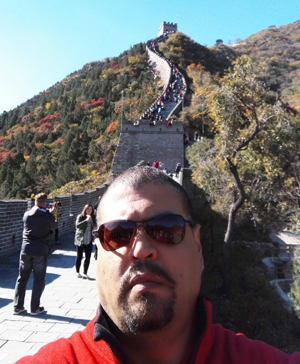
The Juyongguan section of the Great Wall of China is in the Guangou Valley, in the district of Changping, less than 60 kilometers from Beijing, it is the section of the wall closest to the capital (approximately one hour and a half by traffic) and it has been restored in the 1990s. Visiting this section is a good option if we have little time in our itinerary.
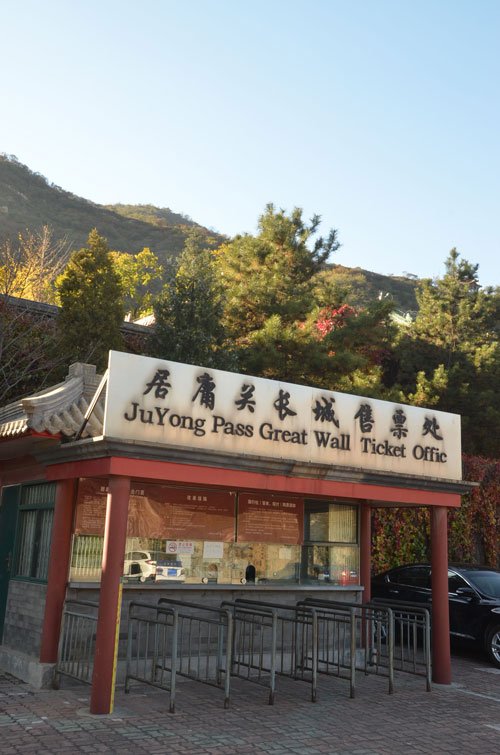
Juyong ticket office, photo: Oscar Arango
When arriving at the place the first thing we see is an imposing mass of marble and bricks, it is the platform of the cloud, a large rectangle with an internal passage of about 9.5 meters high, where today people enjoy the panoramic views, it was built by the Yuan Dynasty in 1342, about this section I will write in the next posts.
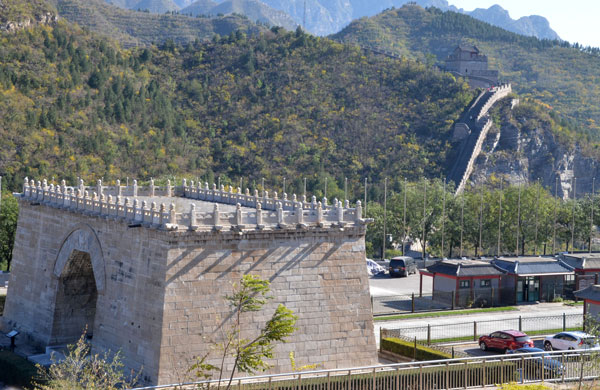
Cloud platform, photo: Oscar Arango
Like the first time I visited the Great Wall, this time I felt the great emotion of being in a special place, full of stories. This section of the Great Wall of the Juyong pass, or step of the north, as it is also known, was built by the Ming Dynasty and, it is one of the most important fortresses from the strategic point of view since it connected the interior of the empire and the area near the northern border of China through a valley that allows direct access to Beijing.
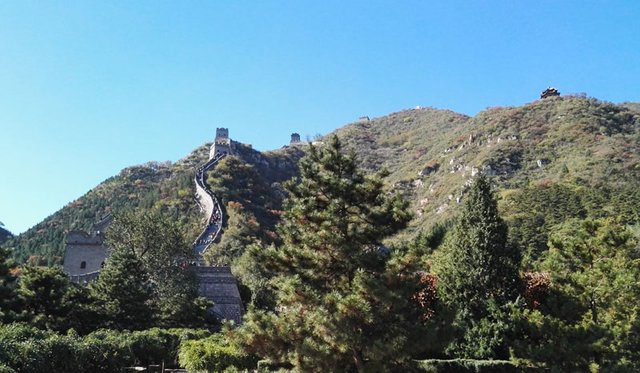
The steep start of the west side wall
The Juyong pass in the north was considered one of the three most important (in addition to the Jiayuguan Pass to the west, and the Shanhaiguan Pass to the east). Although there were many service doors where only one horse passed, there were only three large doors, heavily guarded by many guards to defend the capital (in the case of Juyong). These were used as customs for commercial exchange. In this area great battles were fought against the Jurchen or Manchu and Mongols and became one of the Eight Great Places of Old Yanjing and was praised as "the Emerald Juyong Guan"
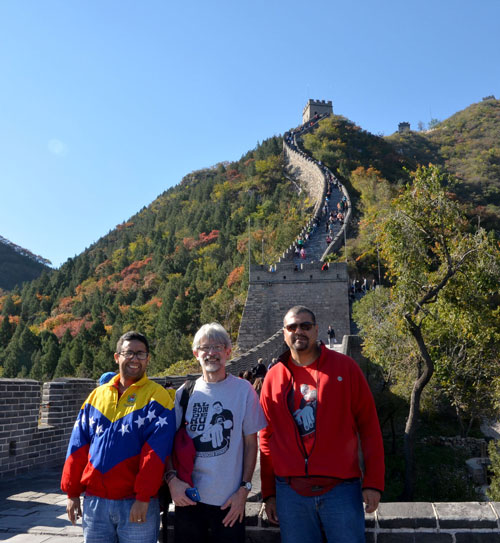
Just before starting to go up together my friends Henry and Oscar, this last author of some of the photos I'm publishing
As soon as we enter we are presented with the imposing wall with two options of travel: go towards the East, which is a short route of the wall, approximately 1.5 km and that only ascends about 200 meters of slope (this option is taken in my third visit the wall and I'll tell you in the next posts), the other option, which was the one you take with other colleagues and friends is to the west side, here stands the wall with a strong inclination where the only thing they see are the thousands of steps that seem to take you to heaven, only if you raise them without getting tired or complaining along their hard journey; some of these step paths must have an inclination of 80 °. The steps are quite irregular in their height and depth (in many you have to climb sideways or with the tips of your feet since they are so small they do not fit full on the step) and make the walk to the highest tower ( tower 13) is quite complicated. You have to take into account that from the base to tower # 13 there is a difference in height or difference of 300 meters above the valley floor and it is about 600 meters above sea level, I saw several people on the way after starting to climb, that after about 20 minutes they suffered from vertigo, they did not know it and they had to go back. This section has a distance of about 2.5 km.
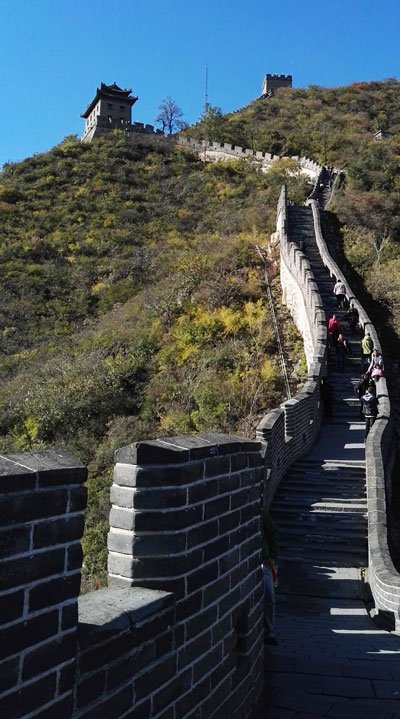
Taking a break before continuing the ascent
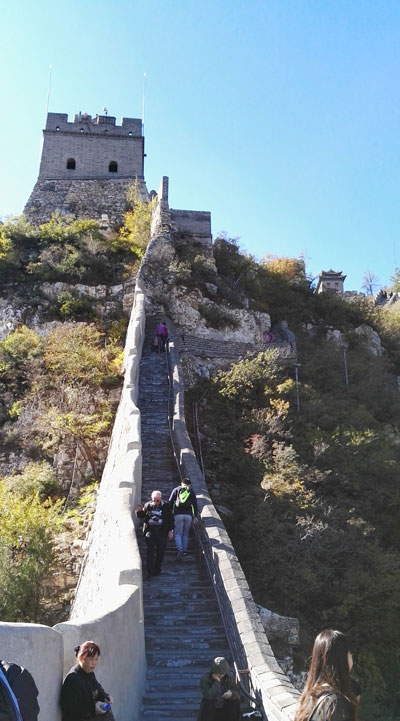
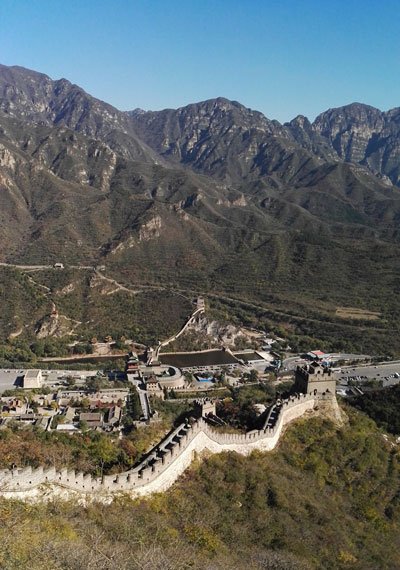
Side view of the serpentine wall, at the bottom of the valley the Juyong pass
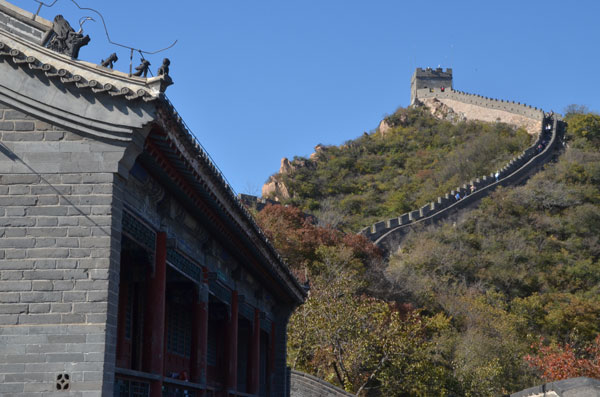
I aim to reach the last Atalaya, photo: Oscar Arango
Once reached the goal (tower 13), the view of the valley of Guangou is wonderful, you can see the entire wall on the east side, as well as the lush and dense vegetation, full of the most varied shades of colors that dress these mountains At the end of autumn, the show and the peace that is lived in that place will be your heaven and your reward, just as it was for me. Climbing all those steps, about 1,500 (according to my calculations), can be devastating if you're not in good physical condition. Many of the steps are very uneven and some range from a few centimeters in height to more than ½ meter, this was a lot for my knees. To tell the truth, before starting the ascent I did not worry about climbing and reaching the top, but rather descending and reaching full down, I thought that if my legs or knees would fail or I would get stuck and the Descent would be very fast and painful. Make sure you have good athletic shoes with a lot of grip, comfortable clothes for your extreme walk, do not forget to bring a good hat or hat that protects you from the inclement sun and a lot, but a lot of water (although you can get some sale of water and soft drinks in some towers).
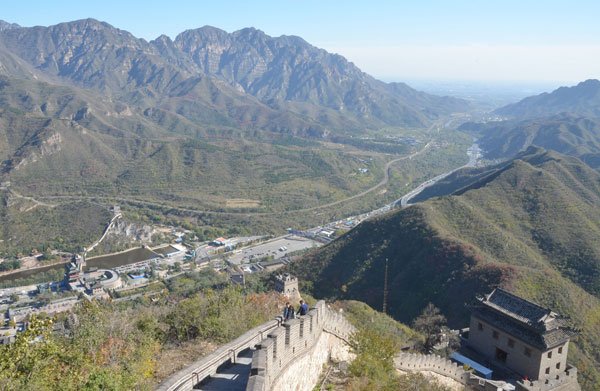
Guangou Valley from the top of the Great Wall, photo: Oscar Arango
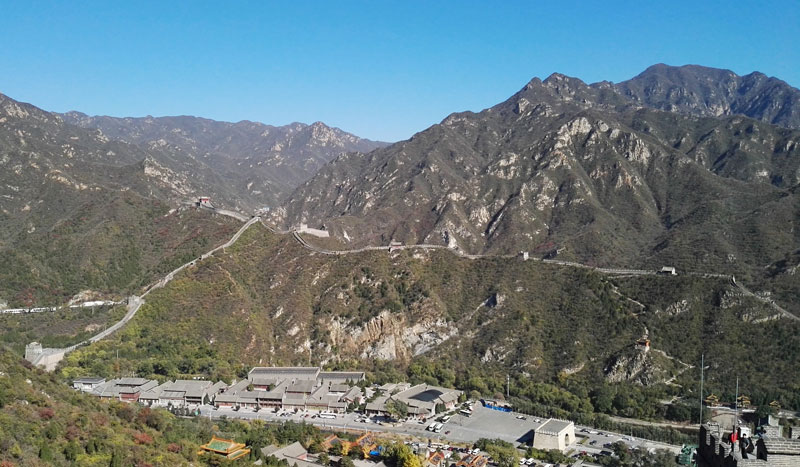
Overview of the wall on the eastern side of the Guangou Valley
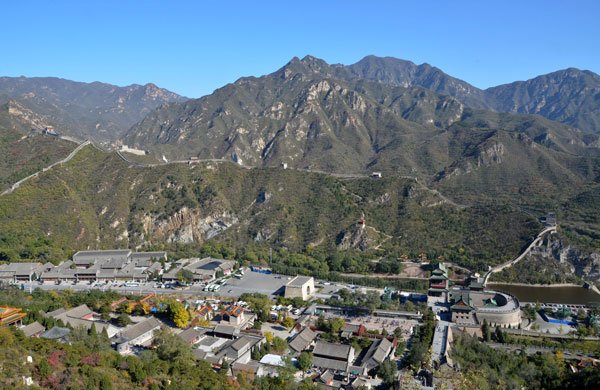
At the bottom of the valley you can see the Junyog pass and the cloud platform, photo: Oscar Arango
Unlike the other walls and fortifications made before the Ming Dynasty, these constructions were stronger and more elaborate, due to the use of bricks and stone instead of rammed earth. Following the Mongol incursions over the years, significant resources were devoted to repairing and reinforcing the walls. These sections of the Ming dynasty near the capital are especially strong and resistant. Here the walls have an average height of 6 meters and the towers of about 13 meters, although the area where the Juyong pass is 7.8 meters high and 5 meters wide.
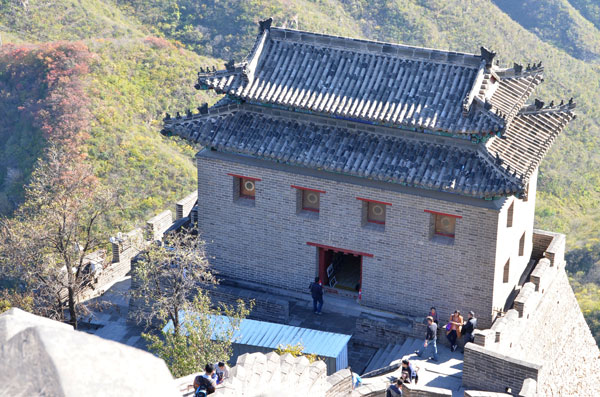
Detail of one of the Watchtower along the way, photo: Oscar Arango
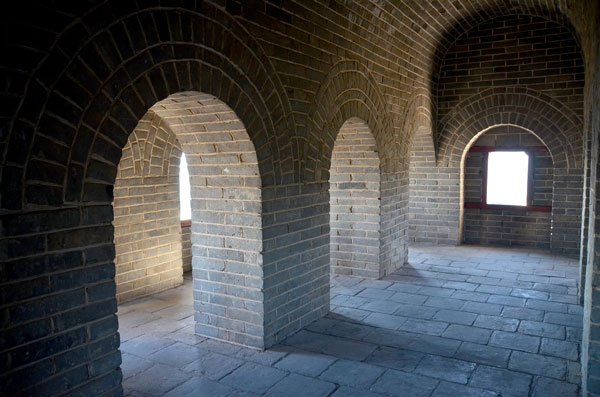
Detail of the interior of one of the fortresses or towers of the wall, photo: Oscar Arango
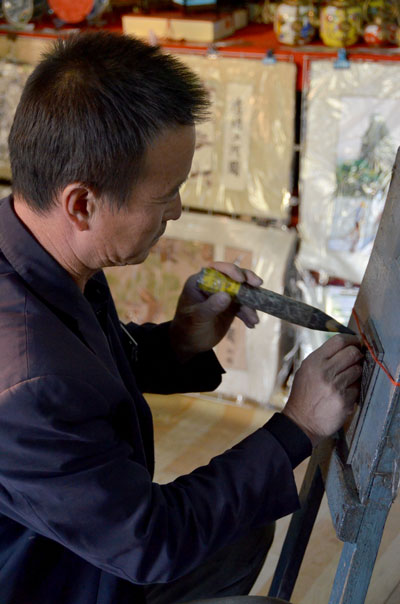
In some of the Watchtower there are sales of handicrafts and on this occasion an artisan carving portraits on slate slabs, photo: Oscar Arango
If at the end of your walk you still have some strength, do not miss visiting the Buddhist temple with its courtyards full of infinite peace, there is also the incense pavilion, the latter has replicas of the terracotta warriors of Xian and of the uniforms worn by the warriors of the Great Wall, will surely help you to know much more about the history and culture of this great nation.
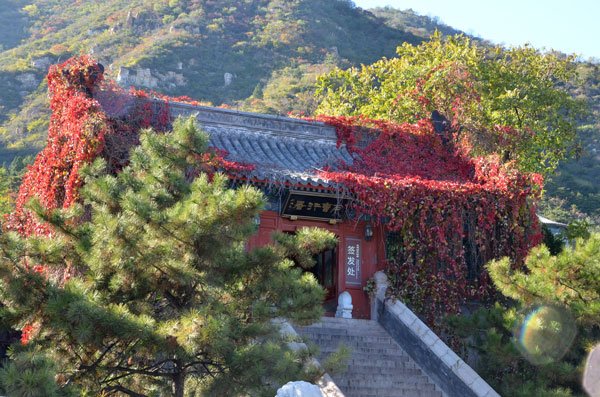
Colorful entrance to the incense pavilion, photo: Oscar Arango
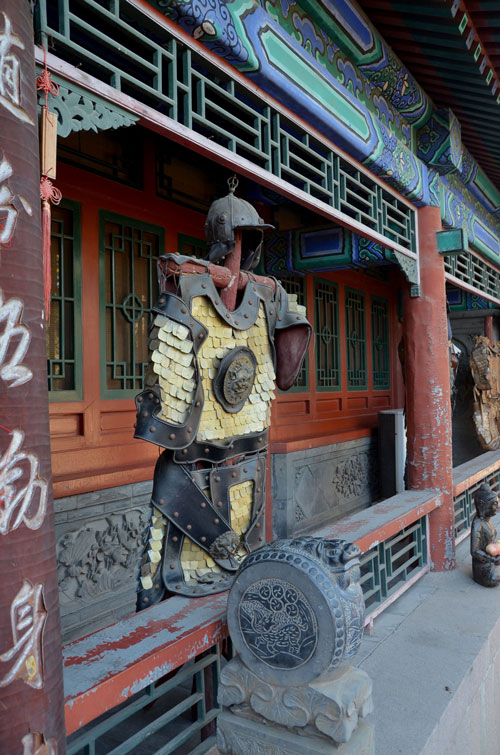
In the inner courtyards of the pavilion replicas of the uniforms worn by the warriors of the wall are displayed, photo: Oscar Arango
Juyong is the second section of the wall that is visited by more tourists, after the stretch of Badaling, and this is because of its proximity to Beijín, the short of its journey and how well maintained it is. I take wonderful memories and experiences of this second visit to the Great Wall of China.
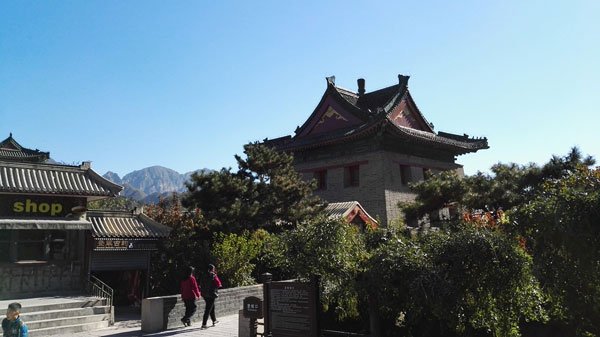
In the vicinity of the wall there are shops of all kinds of crafts to carry a memory of the Great Wall
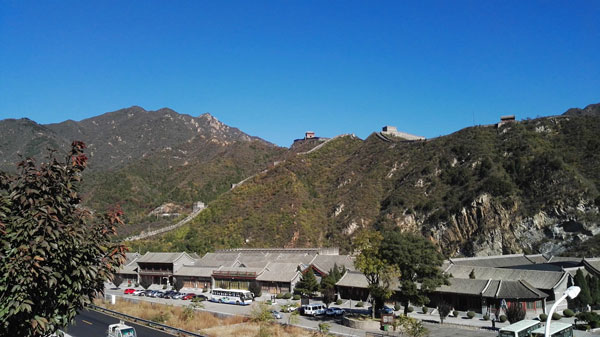
The last look at the Great Wall before leaving
If you liked the experience please write me your comments and follow me for the next posts. A resteem would be very supportive. Thank you.
Very nice experience We await invitation for the next trip.
Downvoting a post can decrease pending rewards and make it less visible. Common reasons:
Submit
You are already invited to the next posts where I will end up with my third trip to the Great Wall of China
Downvoting a post can decrease pending rewards and make it less visible. Common reasons:
Submit
I love your post! you give us a virtual visit to the Great Wall and the photos are like postcards, they take us to your journey.
For those who have the opportunity to visit this masterpiece, do not hesitate.
Thanks @calvinspifs, what I enjoy the most is the pleasant way you tell us your experience
Downvoting a post can decrease pending rewards and make it less visible. Common reasons:
Submit
Congratulations @calvinspifs! You received a personal award!
You can view your badges on your Steem Board and compare to others on the Steem Ranking
Do not miss the last post from @steemitboard:
Vote for @Steemitboard as a witness to get one more award and increased upvotes!
Downvoting a post can decrease pending rewards and make it less visible. Common reasons:
Submit
Very good work friend, excellent photos. Spectacular views to stay contemplating for many hours.
Downvoting a post can decrease pending rewards and make it less visible. Common reasons:
Submit
Without a doubt, they are very eager to spend many hours contemplating these places, but the sun is scorching.
Downvoting a post can decrease pending rewards and make it less visible. Common reasons:
Submit
Congratulations @calvinspifs! You received a personal award!
Click here to view your Board
Downvoting a post can decrease pending rewards and make it less visible. Common reasons:
Submit